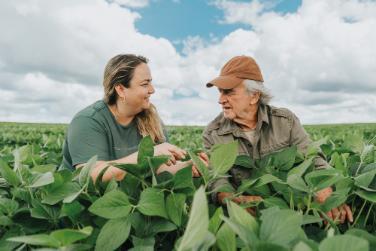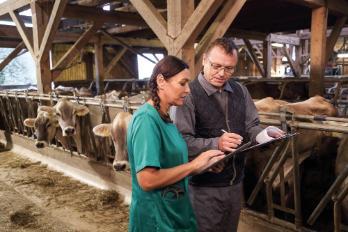Advisors supporting the wellbeing and mental health of farmers
David Meredith, John G. McNamara, Francis Bligh, Conor Hamersley (REDP)

Farmers face many occupational stressors that can have a negative impact on their mental health or wellbeing. This can undermine their and their family’s quality of life.
Teagasc, the Department of Agriculture, Food and the Marine (DAFM), the Department of Health, the Health Service Executive and South East Technological University came together to undertake research on this issue. This resulted in the development and implementation of a training programme to equip advisors with the knowledge to engage with farmers on their health and wellbeing. The research highlighted a range of occupational challenges to farmer mental health or wellbeing, including the pace of change in farming, increasing job demands and growing uncertainty.
Over 200 advisors participated in the ‘On Feírm Ground’ training programme. A quantitative evaluation of the programme established that it improved participants’ self-reported levels of knowledge, capacity, and willingness to support farmer mental health. Additional qualitative findings following up on programme participants revealed how the training was being put into use by advisors in their interactions with farmers.
The success of the training programme resulted in DAFM providing additional funding for the rollout of the programme to other stakeholders interacting with farmers, such as veterinary surgeons and co-operative employees.
Contact: david.meredith@teagasc.ie
Other contributor: South East Technological University.
Funding: Teagasc; the Department of Agriculture, Food and the Marine; the Department of Health; the Health Service Executive.
Impact pathway: Capacity Building.
[photo credit] Igor Alecsander /istockphoto.com
Conversations for Change
Laura Gribben, Áine Regan, Edgar Garcia Manzanilla (CELUP)

Conversations for Change is a communication skills training programme developed for animal health professionals and Teagasc farm advisors. It aims to support shared understanding, collaboration and decision-making between farmer-facing professionals and farming clients.
The skills training in evidence-based communication techniques helps farmer-facing professionals work through challenging topics with farming clients and have effective conversations about change.
Conversations for Change training is supported by, and based on, behaviour change theory, psychological practice, the Motivation, Action and Prompts (MAP) Model of Behaviour Change and the principles of motivational interviewing. The behaviour change intervention, which forms the scientific basis for the Conversations for Change initiative, was developed out of an interdisciplinary collaboration between psychologists, animal health professionals and veterinary scientists in the safefood-funded antimicrobial resistance project.
In 2022 and 2023, Conversations for Change was piloted in the context of animal health with training provided by Animal Health Ireland to 16 veterinary practitioners and eight Teagasc farm advisors. This pilot is being extensively evaluated through a Walsh Scholarship and the evaluation will help provide learning on how best to develop long-term training in this area and expand its application to other advisory programmes
Contact: aine.regan@teagasc.ie
Other contributors: Animal Health Ireland; Queen’s University Belfast; University College Dublin.
Funding: Teagasc Walsh Scholarship Programme; Animal Health Ireland.
Impact pathways: Technology Development & Adoption; Capacity Building.
Further reading: Motivational interviewing in veterinary practice
The map model approaching behaviour change conversations on farm
[photo credit] tomazl/istockphoto.com
Rebalancing power in food supply chains
Maeve Henchion, John Hyland, Oluwayemisi Olomo (REDP)

There is a long-term trend of farmers receiving a decreasing share of the food chain value-added. There are various reasons for this; rebalancing power in the supply chain can be part of the solution. This is one of the objectives of the Common Agricultural Policy (CAP), with short food supply chains (SFSCs) identified as one means of achieving it. However, CAP support for such initiatives only reaches an estimated 8% of all EU farms, hence the need to increase awareness of opportunities amongst farmers.
Teagasc worked with Munster Technological University, within the AgroBRIDGES project, to showcase successful Irish SFSCs; building their capacity by exchanging knowledge with other cases across Europe and supporting others to develop their SFSCs by co-developing and testing a range of tools. Tool development was guided by consumer research and workshops across 12 countries. In total, 12 practical tools were developed, encompassing digital solutions, communication and training materials and event organisation guides. The tools are freely available on the project website.
The knowledge gathered in the project has reached over 350,000 stakeholders in Ireland. This knowledge sharing is a result of contributions to the Teagasc Signpost webinar series, a feature length article in the Irish Farmers Journal, two episodes of the Teagasc Agropreneur series, as well as various meetings and testing events organised within the project.
Contact: maeve.henchion@teagasc.ie
Other contributors: Munster Technological University.
Funding: Horizon Europe.
Impact pathways: Technology Development & Adoption; Capacity Building.
Video: Signpost Series – AgroBRIDGES: challenges and solutions to developing short food supply chains
[photo credit] Arina P Habich/shutterstock.com
